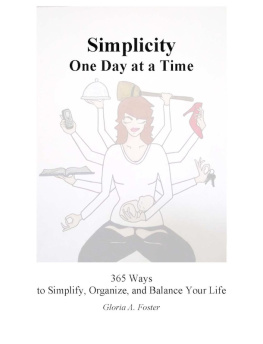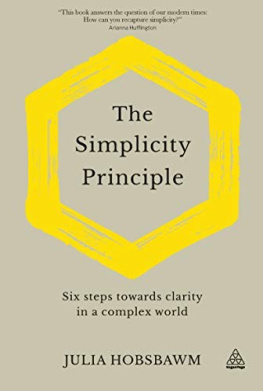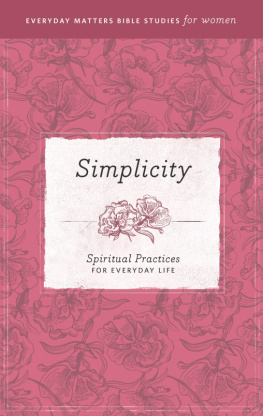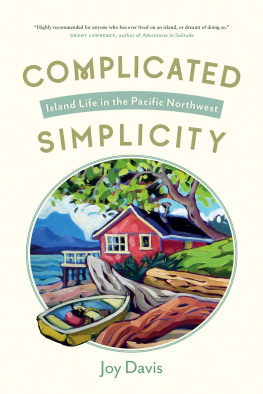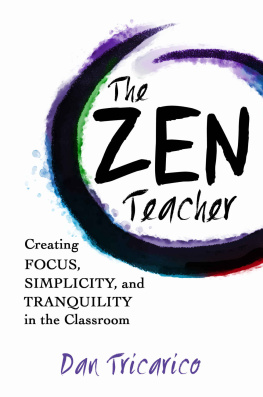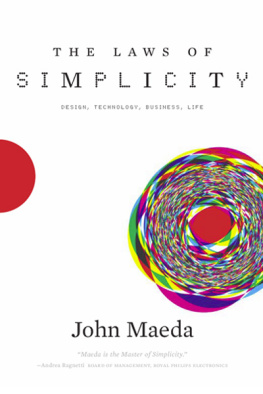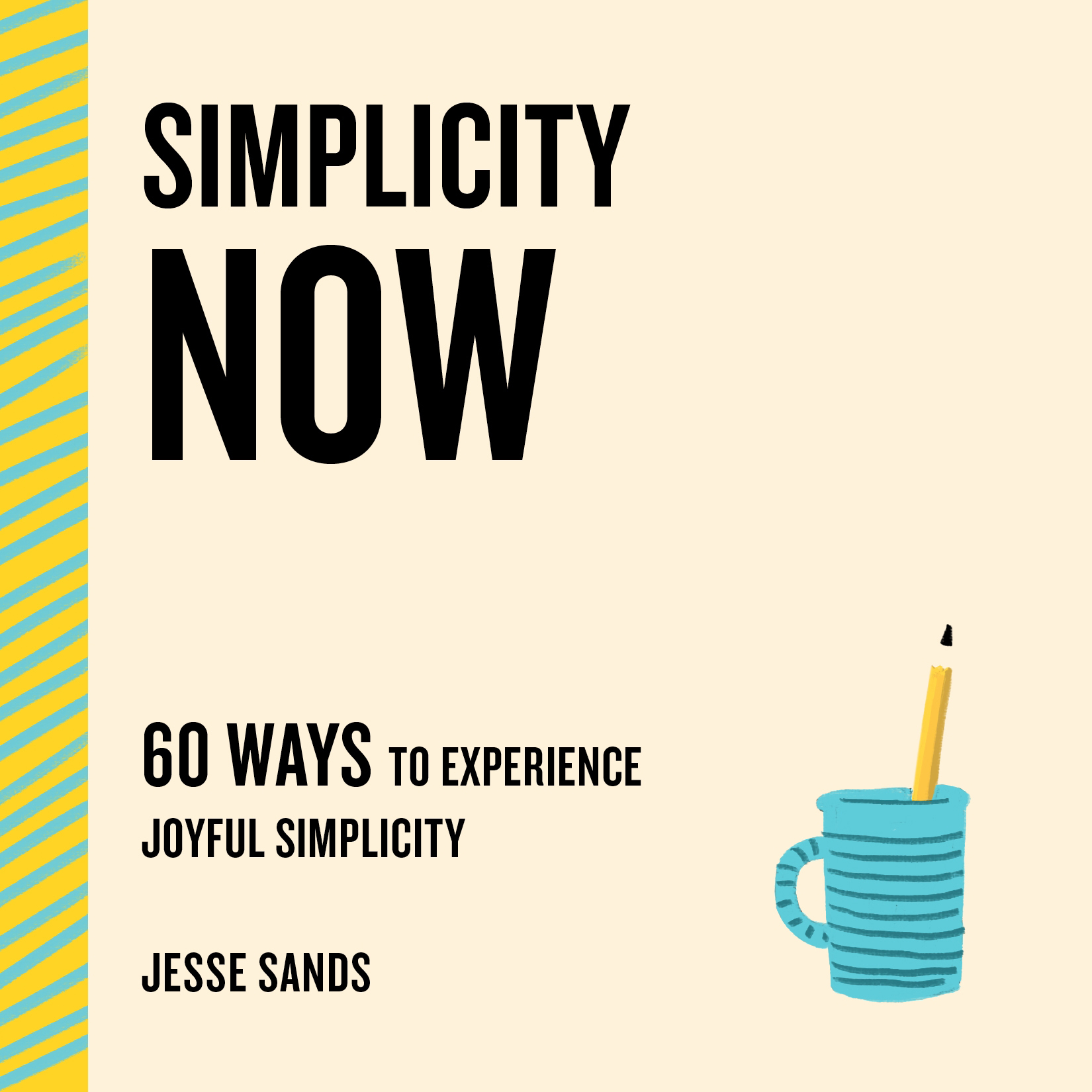The author and publisher have provided this e-book to you for your personal use only. You may not make this e-book publicly available in any way. Copyright infringement is against the law. If you believe the copy of this e-book you are reading infringes on the authors copyright, please notify the publisher at: us.macmillanusa.com/piracy.
The most simple things can bring the most happiness.
Years ago I was in a tough place in my life. I was broke, alone, and unhealthy, both physically and mentally. It was a dark period. When things were at their worst, I felt forced to make changes; it was either change or stay in pain. I began readjusting my attitude and rethinking many of my decisions. I worked to make happiness and abundance priorities in my life. I began to meditate and learned about mindfulness.
All of these positive changes had one very unexpected side effect: I wanted less. Less stuff. Less drama. Less negativity. Less pain. Less of everything that kept me small and hurt and hidden.
As I tried to untangle the mess that my life seemed to have become, I found that I craved the opposite of mess, the opposite of complicated: I craved simplicity. Simple finances, meaning making more than I spend and having savings (and eventually, investments). Simple relationships, meaning ones based on love and respect. A simple home, meaning having only those possessions that create happiness. Simple health, meaning eating less bad stuff, eating more good stuff, drinking more water, and moving more.
This is important: simple doesnt mean easy. It also doesnt mean stupid. Those are two synonyms for the word simple, but they arent the ones I mean when I use it. I mean uncomplicated. Life is complicated enough on its own; theres no reason to make it more so. I found that I was making choices and indulging in behaviors that werent in my best interest. Simplicity meant, for me, making decisions that made my life easier and better.
Bit by bit, my life began to get a little less complicated. Of course, I wanted it to happen fastlike tomorrow! But it had taken me years to get my life in the messy state it was in, so I needed to realize that it would take me some weeks, months, and even years for me to create a life that was in alignment with my goals.
Some things did change quickly. I took on the easy tasks first, clearing out drawers and closets. It felt good to live with more organization. That spurred me to do more. The deeper untangling took longer. I kept at it consistently, and change did happen. But there are still corners of my life Im working on tidying.
In this book, Ive collected the wisdom I learned and the methods I used. I dont mean to tell you that I have all the answers and theres nothing more for me to learnof course not! What I can tell you, though, is that the simpler I make things, the more meaningful those things become.
Simplicity can be applied to every area of your life. Its very popular right now to think of simplifying your life by organizing your house and office. Thats a great way to begin. Surrounding yourself with space and organization will definitely have a positive effect on your life. You can then take this idea into other areas as well.
Remember, though, that simplicity isnt only about whats around you; it also refers to whats inside you. Simplicity in your body, simplicity in your mind, and simplicity in your actions will create positive change in your life. You can achieve this change by making simplicity a priority, one of the values that you work at every day.
Ive learned that, contrary to what our consumer culture would have you believe, less is more. Simplicity is decluttering every part of your life (not just your house). In that decluttering, you create space. And in that space, you will find freedom.
I value simplicity in my life. I choose order and organization over clutter and mess. I say what I mean, and mean what I say. Simplicity brings space to my mind, my body, and my surroundings. Space is freedom. Less is more. Quality over quantity. All is well.
The hardest part of simplifying your life might just be the act of letting go. After all, the things we hold on towhether they are actual physical things, or grudges, or feelingsare connections to memories of the past, good or bad. Things represent our lives.
To let go, we sometimes worry, means we are forgetting the past. But the opposite is actually true. The more we let go of, the more space we haveliterally and figurativelyto remember what is meaningful.
Life is really simple, but we insist on making it complicated.
CONFUCIUS
Try ThisUse What You Have
Go through your house, into your cupboards or drawers, and find two or three (or more) items that you have never used or havent used in a long time. Now, use them.
If you find that these items are no longer needed or wanted, then pass them along. Same with clothes. What clothes are in your closet that you arent wearing? Pull them out, and either begin to wear them or donate them. Use what you have otherwise, why have it?
One popular organizer says that we should hold each object that we own, and keep only those that bring us joy. Thats true, but I would also add that you should keep objects that have value, at least to you. There are many kinds of value, including financial, emotional, and familial. If what you own doesnt have value, its robbing you of time and energy.
Try ThisThe 10 Items
Here is a great question that you can answer yourself or bring up with friends over dinner. If you had to live on a desert island and could take only ten items with you, what would they be?
You can set parameters on this question, such as considering only non-clothing or nonfood items, but the point is to think of what your ten most essential possessions are.
The greatest wealth is to live content with little.
PLATO
We live in a more, more, more society. Ads, television shows, movies all show depictions of people buying, shopping, wanting more, buying more. If one car is good, three is better, and why not have five? If a three-bedroom house is nice, why not upgrade to a seven-bedroom house, each with en suite.
For some people, its a medal of honor to have dozens of pairs of shoes, or multiple expensive watches, or more of anything. But ask yourself this: How much is enough? Is it better to have more or to love what you already have? And lets really get to the deep truth Dont you already have more than enough in several areas of your life? More stuff is suffocating, not liberating.
If thats too difficult, try to narrow it downwhat ten books from your collection would you take to a desert island if you could bring only ten? What ten pieces of clothing? And so on. This will help you prioritize what you have, what you need, and what you can get rid of.
Try ThisReusing in New Ways
Sometimes I think of the sheer number of bottlesboth glass and plasticthat people use and discard every single day. What happens to all of those empty bottles? How do they effect the planet?
If you do an internet search, you will find a variety of information about where bottles (and other trash) go when were done with them. In my quest to make my life as simple as possible, Ive decided to reuse bottles when I can, in as many ways as I can.


